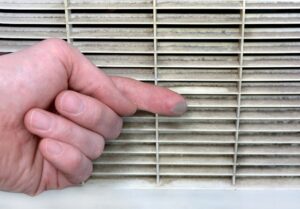
Do the words “air pollution” summon visions of smoggy cityscapes and polluted outdoor spaces? Unfortunately, air pollution isn’t something that only occurs in cities or outside.
The air quality in your home can be worse than the air outside. Unlike the air outside your home though, you have options that allow you to control the quality of the air in your house.
Your home should be a safe haven, not a place that’s potentially contributing to or causing health problems or poor quality of life. If you suspect that your home’s air quality isn’t as clean as it should be, here are some signs of poor indoor air quality (IAQ). If you’re experiencing any of these, we can improve the indoor air quality of your Warner Robins, GA home.
Cough
One of the determining factors in poor air quality is the concentration of particulates in the air. Particulate matter (PM) consists of irritants such as mold, dust, smoke, allergens, and silicates that enter your body when you breathe.
When your air has too much PM, it’ll cause you to cough as your respiratory system tries to expel the irritants. Don’t attribute that lingering cough to allergies. It could be a sign your air quality is poor.
Fatigue And Dizziness
A house with poor filtration isn’t properly filtering the air you breathe, which can also contribute to concentrated particulate matter. Poor filtration combined with high levels of particulates can cause cognitive issues such as fatigue, dizziness, sleepiness, and dizziness.
Frequently Sick
If you’re one of those people who’s always sick, it might not be you. It could very well be the air in your home that’s to blame. Not only that, but once you’re sick, poor air quality causes your cold symptoms to become worse and last longer.
Frequent Headaches
Constant exposure to strong odors and chemicals such as pesticides, household cleaners, formaldehyde, and benzene may result in frequent headaches and migraines.
Mucous Membrane Irritation
Particulate matter causes your mucous membranes to become irritated and inflamed. A frequent sore throat, watering eyes, and a runny nose are signs of irritated mucous membranes. Irritation of the mucous membranes can also cause frequent nosebleeds and headaches.
Dry, Irritated Skin
Poor air quality doesn’t just dry out your mucous membranes, it’ll also dry out your skin. If your skin suffers from flaking, redness, rashes, eczema, and excessive dryness even though you drink plenty of water, it could be the result of your indoor air quality.
Worsened Allergies
It’s bad enough having allergies, but poor air quality can exacerbate allergy symptoms. This is due to the irritants in the air such as pet dander, mold spores, dust mites, household chemicals, pesticides, and more. The lack of proper ventilation and poor indoor air circulation also contribute to allergies.
High Humidity
Worst of all, poor air quality can be exacerbated by the high humidity we experience in Georgia. When humidity is high, the air becomes a breeding ground for mold, allergens, and bacteria. A filtration system combined with a dehumidifier will greatly improve the quality of your indoor air.
Poor air quality is especially harmful to young children, the elderly, pets, and individuals with asthma or compromised immune systems. If you suspect your indoor air quality is poor, contact us to learn about solutions we can provide to improve your air and prevent long-term health problems.
Experience the Premier Difference. Schedule an appointment with Premier Heating & Air.

